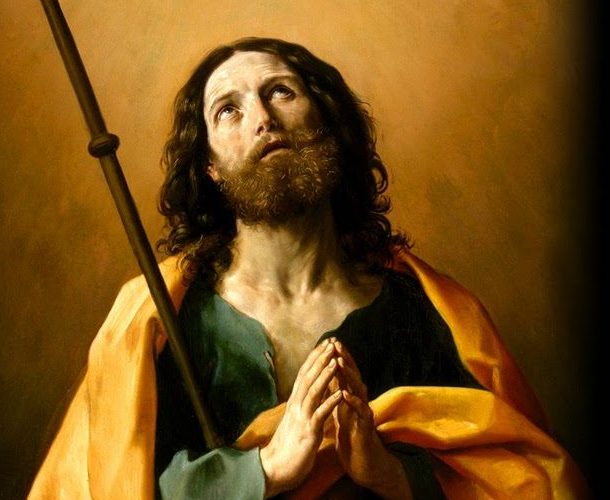By: Jason Songe, Seminarian, Archdiocese of New Orleans
In St. James The Greater, we see the emotional and spiritual transformation possible in someone who gives his life to Jesus.
James, one of the twelve apostles and blood brother of the beloved disciple John, was a son of Zebedee and Salome. James was called from his fishing boat by Jesus and did not hesitate. He is not recorded as even saying anything in response. He simply dropped what he was doing and went where Jesus went.
James, along with Peter and John, had the privilege of witnessing the Transfiguration, the raising to life of the daughter of Jairus, and the agony in Gethsemani.
James and John were known for their rashness, zeal, and short temper. Zeal is defined as “great energy or enthusiasm in pursuit of a cause or objective.” We see it on display in the Gospel of Luke, after the Samaritans would not welcome Jesus because he was on his way to Jerusalem. In a nod to Elijah, who had called down fire on his enemies in the same area they were passing through, the brothers ask, “Lord, do you want us to call down fire from heaven to consume them?’
Predictably, Jesus reproves them, as destroying men’s lives would be inconsistent with the gospel.
In the Gospel reading today, we see that the imperfections of the brothers included ambition, along with aforementioned wrath.
After being asked if they can sit at his left and right, Jesus said in reply, “You do not know what you are asking. Can you drink the cup that I am going to drink?” They said to him, “We can.”
James and John were looking of the places of glory in the Messiah’s victory, and Jesus had to correct them in light of the paschal character of His mission.
Once they see the suffering and weakness of Jesus at Gethsemane, it’s not hard to imagine they may have changed their mind about this cup they agreed to drink from. Especially once Jesus allowed himself to be taken. The two brothers must have been scared and confused. One thing is certain: James was put to the test and did not find himself worthy, as he ran away and was later absent at the cross.
Tradition tells us that James preached in Samaria and Judea in the years after he gained courage at Pentecost.
In order to gain favor with the Jews, Herod Agrippa arrested James around 42 A.D.
According to Clement of Alexandria, Saint James’s accuser—the man who brought James to trial– was so moved by the courage and conviction James showed at his trial that he subsequently repented and declared himself a Christian. As a consequence, the man was sentenced to be beheaded alongside Saint James. As both men were led to execution, the accuser turned to James and begged for his forgiveness. According to Butler’s Lives of the Saints, “St James, after pausing a little, turned to him and embraced him, saying, ‘Peace be with you.’ He then kissed him, and they were both beheaded together.”
Does this sound like the same James who was so quick to answer the offense of Samaritans with death? No. This is a James who had undergone an emotional and spiritual transformation in the decade or so since he had seen Jesus last. He no longer ran from his cross, and he wished peace upon his enemy. By living for Jesus day in/day out for a decade, he had become a living representation of the Gospel.
St. Epiphanius says that James consecrated himself to celibacy for the sake of the Kingdom, was known for his temperance and mortification, and that he only wore one coat.
Can we allow Jesus to enter our hearts and transform us, as James did, so that we can, when called to, drink from the bitter cup and, not only carry our cross, but carry it well?
About the Author: Jason Songe, Seminarian, Archdiocese of New Orleans
Jason is entering his second year of philosophy–PT2.
Disclaimer
All opinions published by the authors on this blog are solely those of the authors. Although the goal is that they should, they do not necessarily express the views and opinions of the Archdiocese of New Orleans, Notre Dame Seminary, the Church, or their respective dioceses and bishops.
Notre Dame Seminary and the Archdiocese of New Orleans are not responsible for the comments of commenters, although every effort will be made to remove offensive comments.
If you should find an error or offensive content, please email the NDS Blog editorial team.

